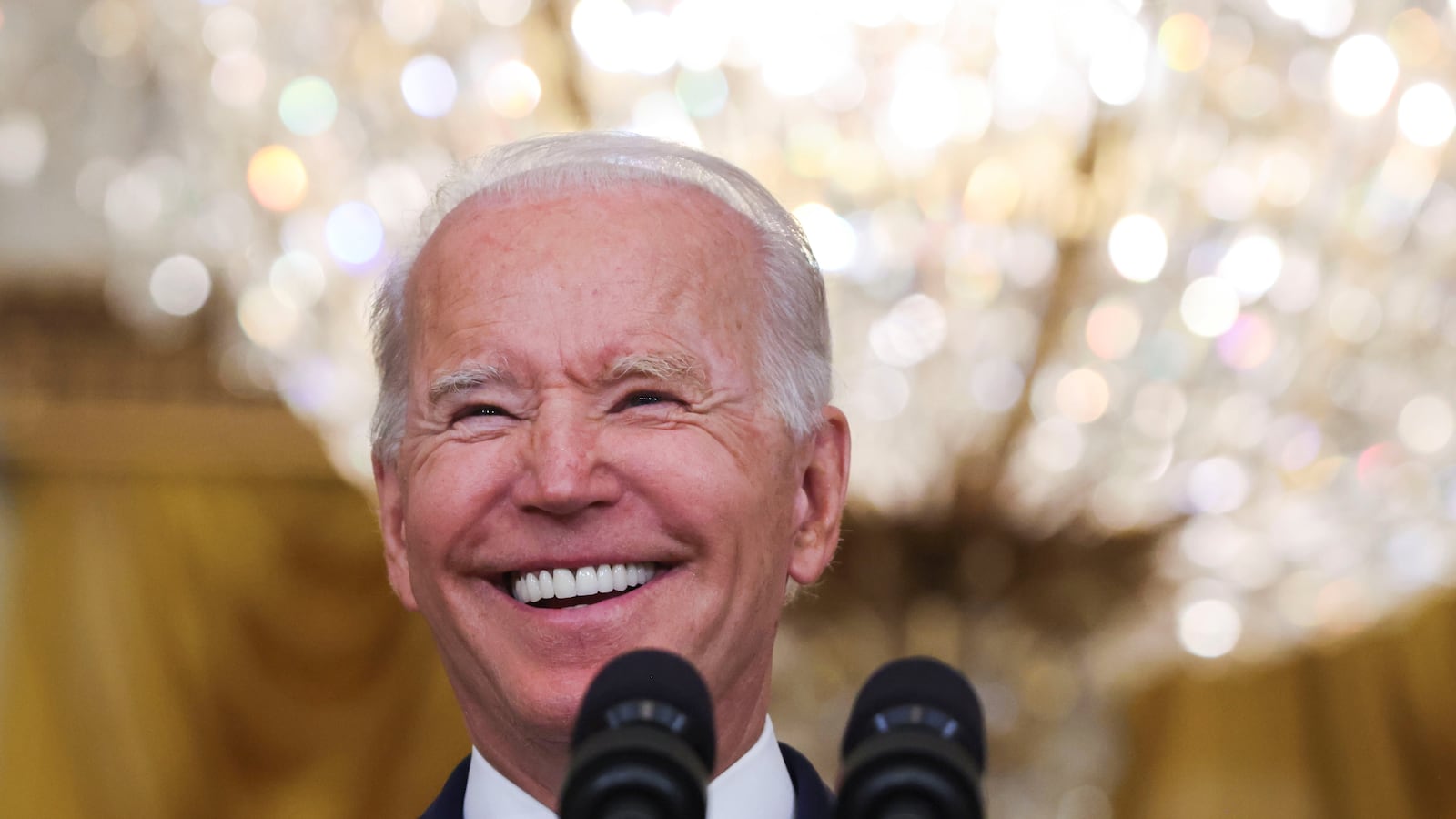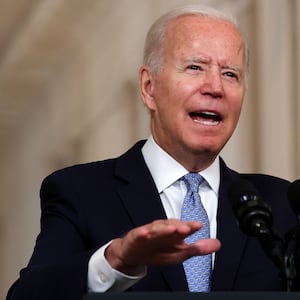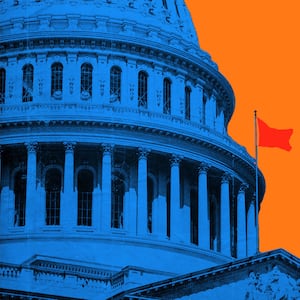After a torturous series of never-ending Infrastructure Weeks, President Joe Biden and congressional Democrats took the largest step yet toward ending the political Groundhog Day.
On Friday night, House Democrats passed a $1.2 trillion bipartisan infrastructure bill, 228-206, with 215 Democrats and 13 Republicans voting for the bill, and six Democrats and 200 Republicans voting no.
Since the legislation has already passed the Senate, the so-called Infrastructure Investment and Jobs Act now heads to Biden’s desk for his signature, allowing the president to claim a major win as his approval ratings sag.
That victory only arrived after Biden and Democratic leaders strong-armed progressive lawmakers enough to get them to relent on what had previously been the party’s official position: that the infrastructure bill travel alongside a $1.75 trillion social spending bill titled the Build Back Better Act.
Progressives had successfully kept the two bills together for months, fearing that moderates wouldn’t vote for the latter without holding the former as leverage.
But with pressure growing from Biden and Speaker Nancy Pelosi (D-CA) to pass the infrastructure bill, progressives had little choice on Friday but to take a legislative leap of faith.
While Biden and moderates got their win, liberals left the Capitol with a successful procedural vote to advance Build Back Better to the House floor—and with a written promise from moderates to vote for the legislation if it gets a positive fiscal analysis from Congress’ independent budget watchdog.
For progressives, the trade was not ideal. But lawmakers acknowledged it was about all they had.
“It erases a lot of the doubt,” Rep. Dan Kildee (D-MI), a member of Democratic leadership, told The Daily Beast. He admitted there was always doubt with these arrangements. "But I feel fairly confident," he said.
After a day that former Congressional Progressive Caucus chairman Mark Pocan (D-WI) dubbed “a clusterfuck,” the vast majority of the CPC decided the commitments from a few moderates to vote for the Build Back Better Act—as long as the Congressional Budget Office came back with a score in line with the White House’s—was enough.
After hours of suspense, at 11:25 p.m. Friday night, the bill passed the House, with Republicans providing the last crucial votes to get the legislation over the finish line.
Clearing the House is not the Build Back Better Act’s main issue, however. That claim to fame belongs to Sen. Joe Manchin (D-WV).
The centrist Democrat's opposition to key planks of the Build Back Better Act has already forced Democrats to cut the size of the bill in half. And he is still not committed to passing the legislation. He said this week it would take some time for him to consider it, but his tone during a Monday press conference seemed to solidify in the minds of progressives that Manchin may never get to yes.
On top of a tenuous path to becoming law, there are immigration provisions in the social spending bill—crucial for some House Democrats—that are likely to get stripped out because they don't conform to the Senate’s special rules for a bill that passes with just 51 votes in the 100-member chamber.
So, for those Democrats who support getting some kind of legislation enacted to fulfill the party’s promises on climate, health care, and the economy, their ability to keep the infrastructure bill tied to the Build Back Better Act has been critical for passing the entirety of Biden’s agenda. Now, they must hope House moderates keep their word—and trust that Biden can somehow get Manchin to embrace a package he has called a “recipe for economic disaster.”
It’s a gamble progressives very reluctantly took. And it’s one that could easily backfire. There’s no guarantee the Senate will pass the social welfare bill, which would include an expansion of universal preschool, investments in affordable housing, an expansion of Medicaid and Medicare benefits, and provisions to lower prescription drug prices for seniors, as well as tax credits for parents, low-income workers, and clean energy.
But faced with the prospect of continued Democratic inaction—and progressives catching the blame for blocking a bipartisan infrastructure bill—Progressive Caucus Chairwoman Pramila Jayapal (D-WA) moved off her earlier demand that the two bills pass both chambers to a new demand: both bills pass the House.
That would allow the infrastructure bill to become law while the president and other Democratic leaders try to win over Manchin on the Build Back Better Act. And that shift prompted new optimism that Democrats could close compromises to please their ideologically diverse and paper-thin majorities.
The problem with this plan, to pass both the bills in the House, was that a half-dozen moderates insisted on seeing a CBO score for the Build Back Better Act. That led Pelosi to develop a new plan, demanding even more concessions from progressives. The speaker wanted to pass the infrastructure bill, and then instead of passing the social spending bill, just set up debate for it.
Initially, the adapted plan was just too much for Jayapal and other progressives. They swore they would vote down the infrastructure bill if the Build Back Better Act wouldn’t pass the House too.
Nevertheless, Pelosi pressed ahead with a vote. She surprised Democrats by announcing votes on the infrastructure bill and the procedural vehicle for the Build Back Better Act for Friday night, and the Progressive Caucus had a marathon session to mull their response.
Members were under immense pressure; Jayapal, who had been open and talkative with the press throughout the process, left at one point without saying a word to journalists. CNN later reported that she was taking a call from Biden, and whereas Biden didn't explicitly ask for Democrats to pass the infrastructure bill last week—when a vote fell apart—he repeatedly pressured progressives to relent this time.
Progressives fumed that the handful of moderates who withheld their support for the Build Back Better Act were not subject to similar pressure. Aides vented publicly and privately about the narrative that progressives are the problem children of the party, when moderates hardly ever face the same criticism. And progressives can credibly claim they are trying to ensure that both planks of Biden’s agenda become law, while moderates leave ample room for doubt over whether they support anything beyond the infrastructure bill.
Still, progressives reluctantly coalesced around a plan to accept the word of a moderate faction that they have openly distrusted—and which has openly distrusted them.
Biden, who cancelled a planned trip to his Delaware vacation home at the last minute Friday, instead spent the evening in the residence alongside his legislative affairs team, “making calls and staying in close touch with leadership and members,” according to a White House official. Vice President Kamala Harris also joined in making calls.
“I am urging all members to vote for both the rule for consideration of the Build Back Better Act and final passage of the Bipartisan Infrastructure bill tonight,” Biden said in a statement released as he joined those calls. “I am confident that during the week of November 15, the House will pass the Build Back Better Act.”
The president, whose frequent calls for congressional Democrats to pass both measures in one go had become increasingly desperate, urged the Congressional Progressive Caucus earlier on Friday to vote on the BIF immediately, according to a White House official, with no mention of the massive social spending measure.
“The president is speaking with House leadership, progressives, and moderates in an effort to come to a solution,” the official said, “and he has been urging a vote tonight.”
Earlier on Friday, principal deputy White House press secretary Karine Jean-Pierre told reporters that the president had been “in close touch” with House members as he advocated for a “yes” vote on a bill that the caucus already supports.
“I can’t speak for the mechanism” on voting Friday, Jean-Pierre said when asked about timing, but “if it’s today, that’s wonderful, that’s great.”
Jean-Pierre was straightforward about the potential electoral effect that the months-long delay in passing the spending packages had on Democrats in elections this week, telling reporters that the loss of the Virginia governor’s mansion was evidence that “the American people felt we hadn’t moved quickly enough.”
“We just have to act—we cannot not deliver for the American public,” Jean-Pierre said, adding that the shortened patience of the American public had become clear to the administration. “The time is now to get this down—that’s how his assessment is.”
Ultimately, Biden got what he wanted. And as the House finished the infrastructure vote, Democrats cheered at a legislative accomplishment that has eluded multiple presidents.
At the end of the long day, Kildee, who was in the House chamber as rioters breached the Capitol on Jan. 6, sought to put the twists and turns in perspective.
“Well, it’s not the craziest day this year,” he said. “We’ve forgotten what argument and negotiation and all of that really looks like. You know, I have not seen one canister of tear gas all day long.”
—Matt Fuller contributed reporting.












